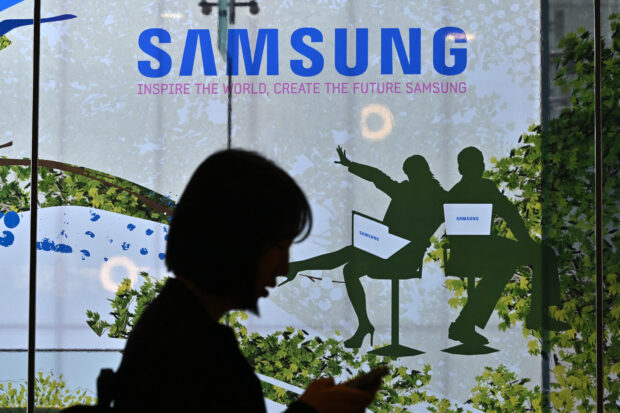
A woman walks past the Samsung logo displayed on a glass window at the company’s Seocho building in Seoul on April 30, 2024. A major union representing tens of thousands of people at South Korean tech giant Samsung Electronics said on May 29 that workers will go on strike for the first time ever, potentially threatening key global semiconductor supply chains. (Photo by Jung Yeon-je / AFP)
SEOUL, South Korea — A major union representing tens of thousands of people at South Korean tech giant Samsung Electronics said Wednesday that workers will go on strike for the first time ever, potentially threatening key global semiconductor supply chains.
A spokesperson said union members, around 20 percent of the company workforce, would use annual leave to strike for one day on June 7, leaving the door open for a potential general strike down the road.
Samsung Electronics is one of the world’s largest smartphone makers and also one of the only companies globally to produce high-end memory chips used for generative AI, including top-of-the-line AI hardware from industry leaders such as Nvidia.
Management at the firm, the world’s biggest producer of memory chips, has been locked in negotiations with the union since January over wages, but the two sides have failed to narrow their differences.
“We are declaring a strike in the face of the company’s neglect of laborers,” the National Samsung Electronics Union said at a live-streamed press conference.
“We have tried to solve the issue through dialogue,” said the union, which represents more than 28,000 people.
“Responsibility for all collective action from now lies squarely on the company. We are declaring our stance in the face of the company’s neglect and interference in our peaceful struggle so far,” it added.
If the strike goes ahead, it would be the first-ever walkout by workers at the South Korean tech giant.
Union president Son Woo-mok said the union had accepted the pay raise proposed by the company but was asking for one additional holiday plus “a transparent system to measure the performance bonus based on the sales profit”.
“The company is not hearing us and they are not communicating from our last negotiation session,” he said.
A company official told AFP: “Samsung will keep in dialogue with the labor union going forward as it has been.”
Samsung Electronics is the flagship subsidiary of South Korean giant Samsung Group, by far the largest of the family-controlled conglomerates that dominate business in Asia’s fourth-largest economy.
A signboard of Samsung Electronics is displayed outside the company’s Seocho building in Seoul on April 30, 2024. Samsung Electronics said on April 30 that its first-quarter operating profits had risen nearly tenfold year-on-year — a 931.8 percent increase — amid recovering chip prices and growing demand. (Photo by Jung Yeon-je / AFP)
Anti-union?
For almost 50 years, Samsung Electronics avoided unionization of its employees — sometimes adopting ferocious tactics, according to critics — while rising to become the world’s largest smartphone and semiconductor manufacturer.
Samsung founder Lee Byung-chul, who died in 1987, was adamantly opposed to unions, saying he would never allow them “until I have dirt over my eyes”.
Internal documents from 2012 obtained by a South Korean MP instructed managers to control “problematic personnel” seeking to establish unions.
“To avoid claims of unfair labor practices, dismiss key organizers before the launch of a union,” it read, among other recommendations.
But in 2019, organizers seized the opportunity presented by the left-leaning government of President Moon Jae-in — a former rights lawyer who represented trade unions — and controversy around the bribery trial of the company’s vice-chairman Lee Jae-yong, the founder’s grandson, to set up a union.
READ: Samsung doubles down on Vietnam
“Having 20 percent of its workforce on strike will significantly impact the company as a whole, especially at a time when it needs to act quickly in the ever-evolving semiconductor industry,” said Kim Dae-jong, professor of business at Sejong University
“Unlike Hyundai Motor, which has dealt with strikes almost annually, Samsung management will struggle to control this situation because it has never dealt with a strike before,” he added.
May lead to a general strike
The union said that as an initial starting measure, they would strike for one day only on June 7 and would use annual leave.
“It could lead to a general strike,” a union spokesperson said, adding that the action was still the company’s “first strike action (and) we believe it is meaningful.”
Semiconductors are the lifeblood of the global economy, used in everything from kitchen appliances and mobile phones to cars and weapons.
And demand for the advanced chips that power AI systems has skyrocketed thanks to the success of ChatGPT and other generative AI products.
Semiconductors are South Korea’s leading export and hit $11.7 billion in March, their highest level in almost two years, accounting for a fifth of South Korea’s total exports, according to figures released by the trade ministry.

